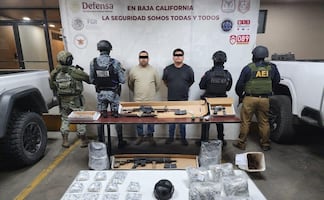Mexico’s government presented four projects of vaccines against COVID-19 to the Coalition for Epidemic Preparedness Innovations (CEPI).
With that, Mexico’s Foreign Affairs Minister Marcelo Ebrard said the country seeks to obtain financing for the development of the project and involve Mexico in the search for the vaccine and the corresponding protocols.
“Our priority abroad is to contribute and be equipped against the pandemic; to ease and promote Mexico as a part of the search for the vaccine .
“Mexico is not a country that waits for others to solve its problems” he asserted.
Recommended:
In a virtual news conference, Ebrard revealed that the projects were presented last Sunday in Norway and are now waiting for the corresponding assessment to know if they will be endorsed by the CEPI and receive the financing.
The CEPI is an international initiative that seeks to create a vaccine against COVID-19. A total of 12 projects will be accepted and will receive financing.
Last May 4, Ebrard Casaubón signed a collaboration agreement with Norway’s Prime Minister Erna Solberg to participate at the CEPI, an organization that was created in order to develop vaccines against new diseases.
The CEPI is currently supporting nine vaccine projects in the world and will soon grant three more financings, one of which could be obtained by Mexico.
Mexico presented a total of four projects : one of them is led by Laura Palomares from the UNAM’s Biotechnology Institute that is working on a recombinant vaccine that was developed against zika and dengue; the second is in charge of the Avimex Company that includes researchers from the IMSS and the UNAM and that developed an immunization for veterinary use and aims to apply it in humans; the third is led by the University of Querétaro that is working on a recombinant chimera, and the fourth is the one led by José Manuel Aguilar in collaboration with the Tec de Monterrey and the University of Baja California that presented a project for a DNA vaccine.
Marcelo Ebrard stressed that Mexico is focused on several lines of work in international terms and has the will to partake in the coalition that provides access to all the protocols and funds.
Recommended:
In case of not obtaining the financing, he added, Mexico will still support the coalition in order to bring all the clinical research protocols to the country.
José Manuel Aguilar, one of the leaders of the projects Mexico presented to the CEPI, did not dream of being a scientist. When he was a kid, he wanted to be a doctor but in the end, he decided to study Biology, and now, along with other Mexican scientists, his dream is to develop a COVID-19 vaccine and to vaccinate 100 million people for free with the first doses.
“It’s important for Mexico to win a place in science, not to mistrust scientists or to have clichés of scientists being dangerous, that they’re villains that make mistakes and therefore end with the world. Having a vaccine in the country will help to bring attention to well-prepared people that aim to help the population,” he said.
For more than three months, he has been leading the Jonas-Salk initiative, named after the man who developed the vaccine against polio and decided not to patent it; the Project has the same perspective: to develop a free COVID-19 vaccine .
Currently, the DNA vaccine is in a stage prior to clinical tests in humans. In order to make it come true, USD $500,000 are needed. In the case of having the funds and positive results, 100 million Mexicans could be vaccinated between September and October 2021.
Recommended:
“We need USD $500,000 to begin, but that would put is in conditions to compete in international forums where Mexico could represent Latin America. Our objective is to raise millions of dollars, which is what is needed for a vaccine to conclude a phase and eventually the whole production of 200 million doses to guarantee its distribution and hence, next year, being able to vaccinate Mexico’s population,” he told EL UNIVERSAL.
The scientist asserted that the main challenge they face is the lack of funds since, as it is a non-profit initiative, there are few groups, companies, and people who want to participate.
“To begin with, it is one of the most important obstacles faced by this kind of project; almost no one wants to support an initiative that pretends to create a free vaccine . The funds are not few, but they are needed in order to run tests in humans. We need the money because it takes quite some time to produce and run the tests.”
He explained that the vaccine they seek to create is a DNA vaccine, that is, it will use the virus’s genetic information to create antibodies in humans.
“This design consists of introducing a DNA fragment from the virus in the body’s cells; then, the genetic information produces a fragment of the virus. This protein uses a key to enter your cells, which is what the virus does: it enters the cell, introduces its genetic material, and creates many copies of itself; however, the genetic material that enters the cells is a small fraction that does not allow the virus to create copies; it is harmless, but it is useful for the body to create antibodies,” he explained.
Recommended:
For the researchers, winning the race for the vaccine against COVID-19 would not only represent a benefit for Mexicans but it would also prove the country has well-prepared scientists that could help the nation in terms of health.
Meanwhile, the National Autonomous University of Mexico (UNAM) is working on 12 projects to tackle the COVID-19 pandemic through different disciplines and will participate in the 2020 Extraordinary Call of the Program to Support Research and Technological Innovation Projects (PAPITT).
The experts will evaluate the evolution of the pandemic with the help of mathematical models and will develop an epidemiological intelligence platform to develop tools and supplies for healthcare, including vaccines .
Other activities included in the UNAM’s 12 projects are the design of fast and cheap methods to diagnose COVID-19 , as well as treatments against the disease based on immunotherapy.

Regarding the social area, the UNAM will analyze the impact the disease is having in Mexico’s economy through a social intervention that considers aspects related to gender as well as the effects of the pandemic in professors and students of the institution.
Four of the 12 projects belong to the Physical and Mathematical Sciences area, five to the Biological, Chemical, and Health sciences area, and thee to the area of the Social sciences. The planning involves 36 academics from different research centers of the UNAM.
Recommended:
The execution of the projects will take place during the first stage of 2021-2021: “It is a measure of extraordinary characteristics the UNAM has adopted to collaborate from different fronts and with different actions in the fight against the coronavirus diseases,” said the UNAM in the official website of the General Direction of Social Communication.
A team of over 50 researchers led by the UNAM is working on different methods to fight COVID-19, including pharmacological treatment, a vaccine, and the detection of the virus’s antibodies.
The group of scientists led by the Institute of Biomedical Research (IIBM) of and the School of Veterinary Medicine (FMVZ) has worked in the development of a synthetic vaccine in which experts identify the regions of the virus that are able to produce efficient immune agents through a chemical synthesis process.
Edda Sciutto, the coordinator of the project, said they will evaluate the possibility of the vaccine being administered intranasally or intravenously to then formulate the optimum composition for the vaccine and tests its efficiency in an animal model, as informed the UNAM in a statement.
The multidisciplinary team with which the national health institutes will collaborate is also working in a treatment based on dexamethasone in small doses that works as an anti-inflammatory through insufflation. Moreover, it would help control respiratory complications in seriously ill patients and prevent intubation, as well as reduce the time of respiratory assistance in the most serious cases of the disease.
Recommended:
The experts explained that the intranasal administration is innovative for it allows to reduce the doses which result in fewer negative collateral effects in the patient’s immune system.
Joselín Hernández, from the UNAM’s Experimental Medicine Unit, added that “those who are at hospitals need more tools to prevent hospitalized people to end in the intensive care unit, and not to die once there,” and reminded that the project is really helpful “mainly in order to evaluate whether the use of glucocorticoids can prevent patients from developing critical cases.”
As of antibody detection, the scientists are working in a study to detect them through the use of serums from patients who have recovered from COVID-19 provided by the National Institute of Respiratory Diseases (INER) and the National Institute of Medical Sciences and Nutrition, and from which they have already identified five molecules that could help in the diagnosis of immunity.
Researcher Juan Pedro Laclette said that in order to resume daily activities, it will be necessary to establish an immune control. “We need to know what proportion of the population has contact with SARS-CoV-2 ; we know that most of them are asymptomatic and the evolution of the pandemic can be evaluated in the country with the use of massive testing and thus make better decisions.”
Recommended:
mp
Noticias según tus intereses
[Publicidad]
[Publicidad]














